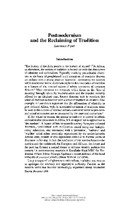| dc.contributor.author | Piper, Laurence | |
| dc.date.accessioned | 2021-01-29T07:32:21Z | |
| dc.date.available | 2021-01-29T07:32:21Z | |
| dc.date.issued | 1998 | |
| dc.identifier.citation | Piper, L. (1998). Postmodernism and the reclaiming of tradition. A Journal of Social and Political Theory, 92, 97-112 | en_US |
| dc.identifier.uri | https://doi.org/10.3167/004058198782486000 | |
| dc.identifier.uri | http://hdl.handle.net/10566/5797 | |
| dc.description.abstract | The history of the Zulu people is the history of myself'.1 In Africa,
as elsewhere, the notion of tradition is bound up with the discourses
of ethnicity and nationalism. Typically invoking pre-colonial identi-
ties as the basis of peoplehood, such narratives of common descent
are imbued with a strong sense of 'pastness', orientating the modern
self in traditional terms. Anderson explains this invocation of tradition
as a feature of the inverted nature of ethnic narratives of common
descent.2 More common are accounts which focus on the ioss of
meaning' brought about by modernisation and the psychic security
offered by an idealised past. Recent theories look to supplant this
sense of tradition as reaction with a sense of tradition as creation. One
example is Lonsdale's argument that the affirmation of ethnicity in
post-colonial Africa, with its associated invention of tradition, must
be seen in the context of internal debates over civic virtue as pre-colo-
nial moral economies are re-structured by the state and capitalism. | en_US |
| dc.language.iso | en | en_US |
| dc.publisher | Berghahn books | en_US |
| dc.subject | Postmodernism | en_US |
| dc.subject | Reclaiming of tradition | en_US |
| dc.subject | History Zulu people | en_US |
| dc.subject | Ethnicity and nationalism | en_US |
| dc.subject | Africa | en_US |
| dc.title | Postmodernism and the reclaiming of tradition | en_US |
| dc.type | Article | en_US |

